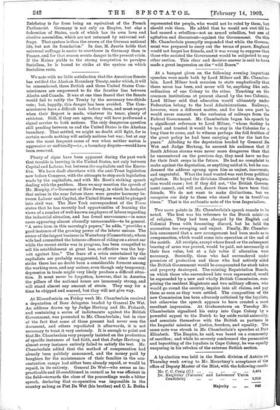Plenty of signs have been apparent during the past week
that trouble is brewing in the United States, not only between Capital and Labour, but between the capitalists and the Execu- tive. We have dealt elsewhere with the anti-Trust legislation now before Congress, with the attempts to stop such legislation made by the capitalists, and with Mr. Root's striking speech dealing with the problem. Here we may mention the speech of Mr. Murphy, the Governor of New Jersey, in which he declared that unless in the near future there were greater harmony be- tween Labour and Capital, the United States would be plunged into civil war. The New York correspondent of the Times states that he has recently had opportunities of learning the views of a number of well-known employers of labour regarding the industrial situation, and has found nervousness—in some cases appearing almost absurdly unreasonable—to be general. "A news item in this morning's papers," he adds, "provides a good instance of the growing Dower of the labour unions. The owner of the largest business in Waterbury (Connecticut), whose wife had committed the heinous offence of riding on a street car while the recent strike was in progress, has been compelled to sell his establishment at great loss, so effective was the boy- ;rott against him." The fears of a crisis entertained by the capitalists are probably exaggerated, but ever since the coal strike there has no doubt been a considerable ferment among the working men, and any serious, even though only temporary, depression in trade might very likely produce a difficult situa- tion. It must never be forgotten, however, that in America the pillars of the national house are immensely strong, and will stand almost any amount of strain. They may for a time be chipped and scarred, but they will not give way.






































 Previous page
Previous page